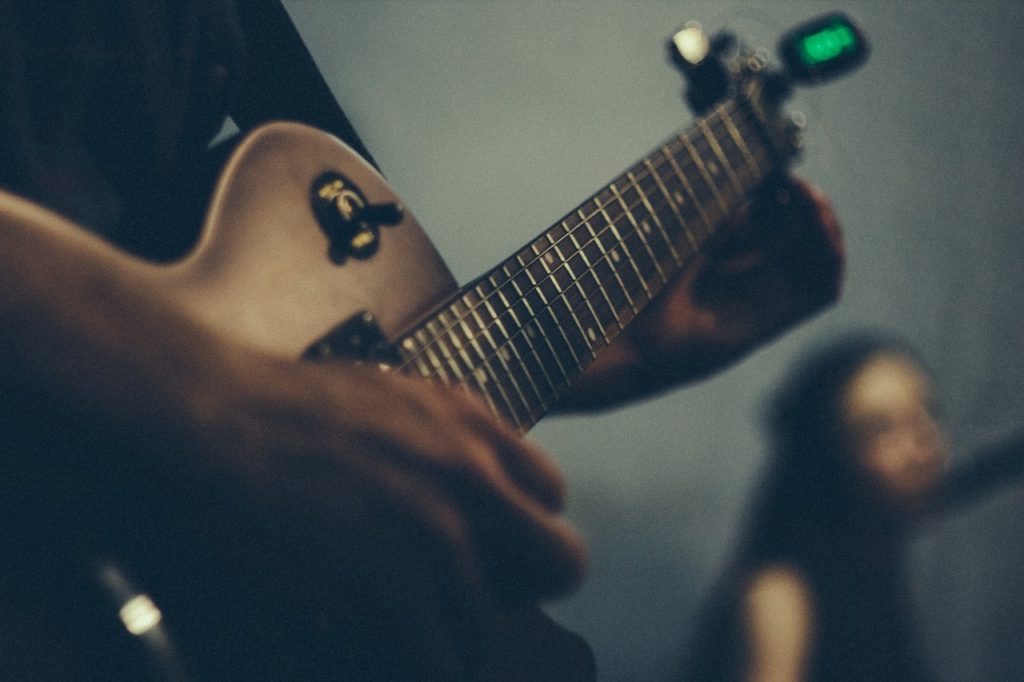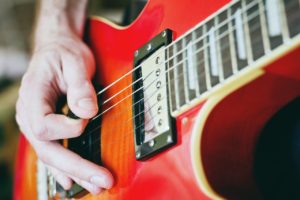To Make Your Guitar Sound Awesome
Estimated reading time 9 minutes
Table of Contents
Introduction
Does your guitar sound out of tune even when the tuner says you’re in tune? Do you have trouble tuning by ear or want to get a better guitar tone? Not all guitar tuners have been created equal. Read more to learn how to use an extremely accurate guitar strobe tuner to make your guitar sound awesome.
So far, we’ve looked at many ways to tune the guitar by ear.
- However, we’ve done it differently from how people usually tune.
- Most guitarists will either use a series of unison notes to compare open strings with fretted notes.
- Or they might use a guitar tuner, such as the poplar Snark Guitar Tuner.
However, we’ve been looking at tuning guitar open tunings by strumming all of the open strings while working the tuners.
- Or we’ve been getting into open tunings using exotic schemes for tuning with harmonics.
- This allows us to have uneven tunings for the open and barre chords.
- That in turn creates chord coloration, which has much the same effect as the 19th century key coloration.
- Nevertheless, some people new to tuning outside the confines of equal temperament (ET) will feel unnerved at attempting to get an open tuning tuned up by ear.
How can I help? Options exist for using guitar tuners to make your chords sound better than what you can get with ET.
- This includes using an extremely accurate guitar strobe tuner to make your guitar sound awesome.
- Note: I get nothing from the companies that make the tuners for discussing these products.
This article uses technical musical terms. For definitions, see the Glossary at the end of the post.
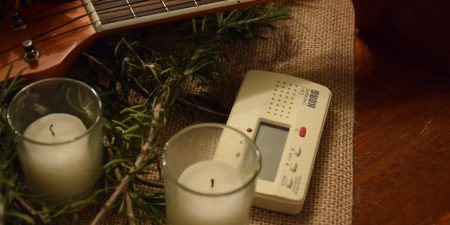
How to Use an Extremely Accurate Guitar Strobe Tuner: Tuning Review
Before we look at how to use an extremely accurate guitar strobe tuner, let’s review the guitar, ukulele, and banjo tunings we’ve discussed so far.
All of these posts talk about better ways to tune fretted string instruments by ear:
Robert Belfour and Extremely Accurate Guitar Strobe Tuners
Mostly, we’ve looked at open tunings so far:
- I started with open tunings, because they will be easier to tune up so that the chords sound super in tune.
- Yet, with standard tuning, this will be harder to achieve.
- However, in the post, How to Tune Country Blues Guitar, we looked at how Robert Belfour held an open E chord while tuning up standard tuning.
- This allows the major third in the E major chord to sound better in tune.
Using extremely accurate guitar strobe tuners, we can fine tune select chords while still in standard tuning to simulate what Belfour did by ear. I will show you how to do this for both the open A and open E major chords.
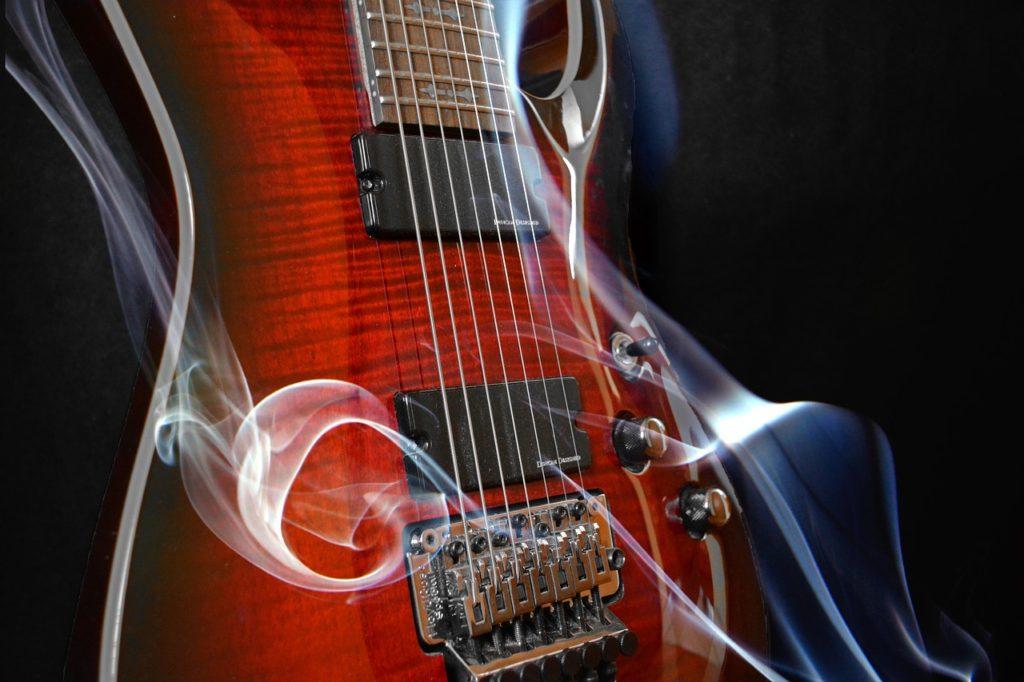
The Snark Style Tuners
Accurate vs. Extremely Accurate
As I stated above, not all tuners have been created equal.
- The Snark will do the job if you just want to have something to get your guitar more or less in tune with ET.
- However, when I say, “extremely accurate guitar strobe tuners,” this isn’t one of them.
This doesn’t mean the Snark can’t be called an accurate tuner.
- It does what the company designed it to do.
- We just can’t call it an extremely accurate guitar tuner.
- These types of tuners will generally be accurate to about one cent, which will sound okay.
- However, all the chords will be slightly out of tune, because they tune to ET.
- Click here to review cents.
- Nevertheless, the tuner display just tells you if you’ve gotten your target note in tune with ET.
- On the other hand, it doesn’t give you any idea of how many cents sharp or flat you’ve tuned your string.
Why Does This Matter?
You may ask, “Why does it matter if we have a display that shows the cents?” In all of the open tunings discussed in the posts in the second section, the major third tunes low.
For example, the strings look like this when tuned to ET:
E1 = 400 cents
B2 = 1100 cents
G3 = 700 cents
D4 = 200 cents
A5 = 900 cents
E6 = 400 cents
If you held down an E major chord, it would then look like this:
E1 = 400 cents
B2 = 1100 cents
G#3 = 800 cents
E4 = 400 cents
B5 = 1100 cents
E6 = 400 cents
The third, fourth, and fifth strings on the second chart have different notes because the E major chord fingers the notes on those strings.
- When the major third (the G#) has been tuned low, the G# will range from 798 cents down to 778 cents.
- With the Snark, we can’t easily tune the major third low, because the display doesn’t give any clear clues on how low you’ve gone.
For this we need more precision, preferably using an extremely accurate guitar strobe tuner.
Mobile users: for best results reading the charts, tilt your screen 90o to the right.
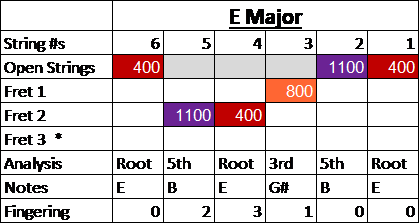
How Does an Extremely Accurate Guitar Strobe Tuner Impact the Sound?
So really, how much does an extremely accurate guitar strobe tuner impact the guitar’s sound? The following two soundtracks show how the G chord sounds when fine-tuned very differently.
Our first track has the chord tuned to ET. The second track has the major third lowered to 386 cents using the Turbo Tuner ST-122 strobe tuner.
- Track #1 sounds like “curdled milk.”
- Track #2 sounds better, stronger, and more vivid.
However, while the tuner you use remains an important tool, how you tune makes all the difference in the world.
Equal Tempered Chord:
Lowered Major Third Chord:
The Homyl Style Tuners
I own a Meisel COM-80 contact tuner. Like the Snark, it provides the ability to tune your guitar to ET. However, its display will show you if your string is 20 cents or 50 cents above or below the ET note.
- Sadly, it looks like you can’t get this product anymore.
- Nevertheless, the Homyl
- Clip-On Guitar Tuner has a similar display.
- Some Korg tuners also have similar displays.
This means you could use the Homyl tuner in the normal manner to tune strings 1, 2, 4, 5, and 6. For string 3, you could tune it low by watching the display.
- Aim for the arrow to point halfway between 0 cents and -20 cents.
- This will give you a lowered major third, making the E major chord sound better and more vibrant.
Also, it will put you roughly in tune with the tuning system I created called Supplemented Equal Temperament (SET) 10 Cent Resolution.
- The Downside: Your tuning won’t be as accurate as you get with a strobe tuner. In other words, the Homyl will be more accurate than the Snark, because of the Homyl’s display. However, it isn’t an extremely accurate guitar strobe tuner.
- The Upside: At slightly over $9.00 the Homyl tuner won’t break the bank, so you can start to experiment with SET tunings on a budget. It will also start to train your ear to hear better tuned major thirds. That way you can eventually transition to tuning by ear, which the posts in the second section will teach you how to do.
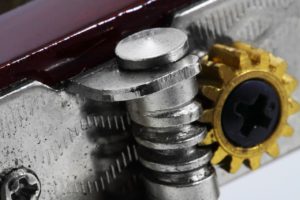
The Turbo Tuner Style of Extremely Accurate Guitar Strobe Tuners
I own the Turbo Tuner ST-122. I have been really happy with its performance over the years. However, this tuner also seems to be out-of-stock.
- Instead, the Turbo Tuner ST-300 has replaced it and is the same type of extremely accurate guitar strobe tuner as the ST-122.
- The ST-300’s tuning precision allows it to tune notes to +/- 0.02 cents. Click here to see the manual PDF that explains how to use this feature.
- This gives you the power to very precisely fine tune your strings.
Also, it gives you the ability to tune to non-ET temperaments with a suppleness that even tuning by ear lacks.
- The Downside: At around $140.00 the Turbo Tuner can be kinda pricy.
- The Upside: It gives you state-of-the-art control (that other strobe tuners don’t) and has superior precision (the hallmark of strobe tuners) when tuning your strings.
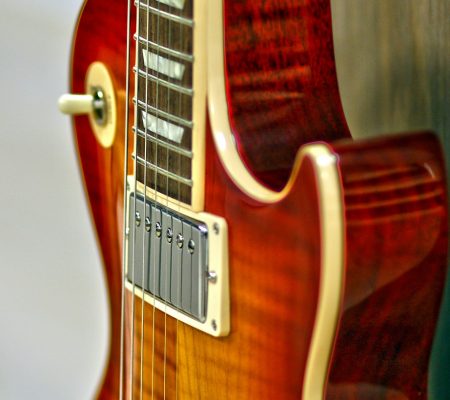
Using an Extremely Accurate Guitar Strobe Tuner
Tuning Centered Around the A Major Chord
If you already own an extremely accurate guitar strobe tuner, get the strings into this tuning:
E1 = 400 cents
B2 = 1096 cents
G3 = 700 cents
D4 = 200 cents
A5 = 900 cents
E6 = 400 cents
If you hold down an A major chord, it will then look like this:
E1 = 400 cents
C#2 = 96 cents
A3 = 900 cents
E4 = 400 cents
A5 = 900 cents
E6 = 400 cents
Using the ST-300, you will tune the second string to -4 cents. All the other strings will be tuned normally – no cent offset at all.
- This tuning favors A major, because you’ve tuned the A chord’s major third to 396 cents.
- C# 96 + 1200 [the octave] – A 900 = 396 cent major third.
- That will make the A major chord sound better and stronger.
- With the C# only slightly low, other chord voicings will still be useable.
Learn the chords in the video below.
- You will hear that your A and G chords sound stronger and muting the fifth string in the G chord makes it sound even better.
- The chord charts show how the lowered second-string changes the tuning of some common guitar chords.
Want to try it out before buying an expensive tuner? Use this free online guitar tuner for the experimental standard guitar tunings!
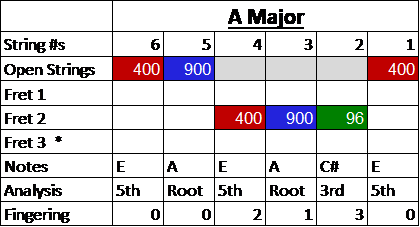
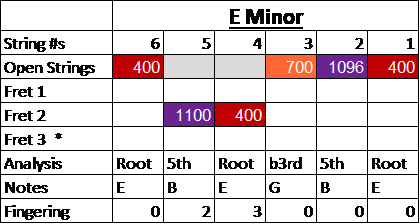
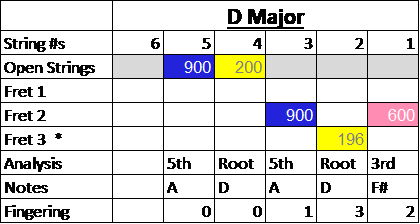
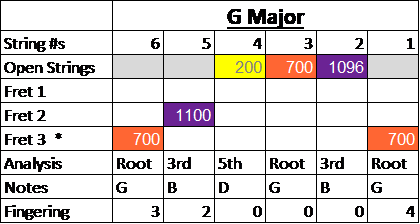
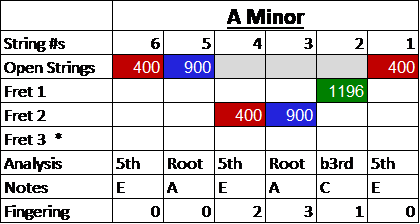
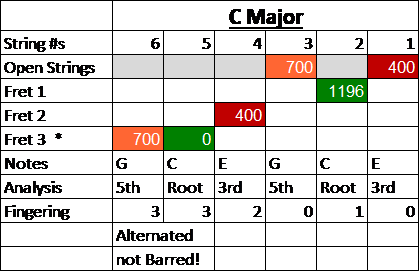
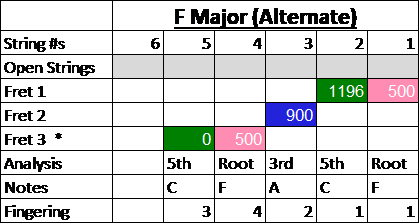
Rock Guitar Open Chord Lesson Video
Tuning Centered Around the E Major Barre Chords: SET Tuning
Now use your extremely accurate guitar strobe tuner to lower the major third to 390 cents in the E major chord.
- If you have the ST-300, tune the third string to -10 cents.
- All the other strings will be tuned to ET.
- You will now be in tune with the SET 10 Cent Resolution tuning system (click here to see the chart).
- Also, using the turbo tuner to tune to SET will allow you to tune to SET-10-Cent-Res-tuned synths. (Click here for a general discussion of tuning SET tuned guitars and synths so they work together.)
Here are how your strings will look:
E1 = 400 cents
B2 = 1100 cents
G3 = 690 cents
D4 = 200 cents
A5 = 900 cents
E6 = 400 cents
If you hold down an E major chord, it will then look like this:
E1 = 400 cents
B2 = 1100 cents
G#3 = 790 cents
E4 = 400 cents
B5 = 1100 cents
E6 = 400 cents
Here the E major chord will be even more in tune than the A chord was, so it works great for E-form barre chords.
- However, other chord voicings become unusable, because they become excessively out of tune.
- Try some of the chords from the previous section and see for yourself.
- In other words, the better you get one chord in tune, the more the other chords become less in tune and vice versa.
- This seems to be a good general rule of thumb.
Since the song All Day and All of the Night uses only E-form barre chords, it will sound fantastic with this tuning. See the video below to learn the song.
Again, you can use this free online guitar tuner to try out the experimental standard guitar tunings!
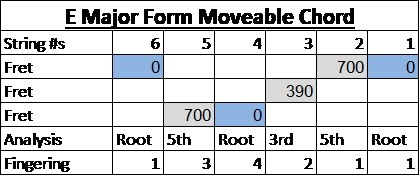
All Day and All of the Night Video
Concluding Thoughts on Using Extremely Accurate Guitar Strobe Tuners
Using an extremely accurate guitar strobe tuner will give you the flexibility to tune your strings to any cent value you want.
- However, keep in mind that the flexibility to tune your strings to any cent value does not automatically yield nice sounding results. Your tuning scheme also makes a big difference.
- Here SET can help as a structuring model.
- In addition, you can experiment with tuning the major third(s) low on different open chord shapes: E, A, D, G, C, and F major.
- All of these open chord shapes can, to one degree or another, be converted to movable chord forms.
Also, try lowering the major third to a value between 386 and 398 cents, and see which styles of music each tuning works with best.
- I decided to demonstrate a slightly lowered major third on the A chord and a deeply lowered third on the E chord.
- The slightly lowered third has less intense tone color but allows you to use many open chord shapes.
- Conversely, the E major chord’s deeply lowered major third really brings out the tone color of the chord, especially when you use distortion.
- However, other open chord shapes become unusable, because they become out of tune.
- Realize that we could just as easily have done it the other way around with the A having the deeply tuned third instead.
As you experiment with the tunings, try them with songs in multiple styles. Notice how the tunings impact the sound of the song, and how this impacts the interpretation of the lyrics. Have fun!
© 2022 Geoffrey Keith
Join me for in-person or online lessons today!
Glossary
How to Color Code Music to Get LD Students to Perform Accurate Alternate Picking
Even among typical learners, students find alternate picking and strumming challenging. It is one of the few color-coding strategies I use with every student. Using color-coded arrows as a guide to alternate picking effectively shows students how to accurately execute the picking patterns. Estimated reading time 2 minutes.
Read MoreMusical Talent and Giftedness
Music teachers: do you have students who show musical talent and giftedness? Do you need some information on how they learn? With musically gifted and talented students, just like any other students, you need to meet them where they’re at, making the adjustments in their playing based on what you see. That way, they can become better students than before they came to you. Keep reading to learn more about musical talent and giftedness. Estimated reading time 4 minutes.
Read MoreHow to Write a Song with a Catchy Chorus (Including Lyrics)
Do you want to learn how to make your own songs? Do you need help with your lyrics? There are many different song forms, and not all of them use a chorus. However, the verse/chorus form is one of the most popular. Songwriters and lyric writers both will find this post helpful. Keep reading to learn how to write a song with a catchy chorus. Estimated reading time 3 minutes.
Read MoreHarmony and Melody Tune Differently
Have you ever felt embarrassed because someone said you sang or played out of tune? Does harmonizing seem like a puzzle you can’t solve? Knowledge is power. I will show you how harmony and melody tune differently, and how it impacts singing and playing in tune. Estimated reading time 4 minutes.
Read More
